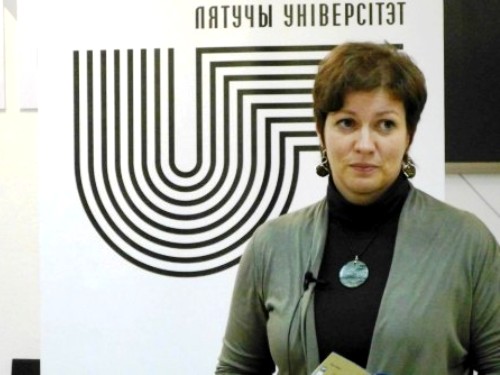Poland and Germany were both initiators and drivers of a New Eastern policy linked to the Eastern neighborhood and Russia/Soviet Union.
Tatiana Vadalazhskaya: There is hope that we are getting the results we were planning to get

What events became really significant for the Flying University last year? And where shall we move next?
Despite the fact that Belarus falls behind the European educational trend for several decades and is still hoping to get into the European Higher Education Area (EHEA), for many years lectures of the Flying University are helping Belarusans to expand their own images about the world around them.
This autumn a number of such events took place. Let us recall some of them.
When do professors treat their students as dupes, and what for one should spend the best years on university that doesn’t change anything within a person? A provocative lecture of Uladzimir Matskevich, a philosopher and a methodologist made former students doubt the value of their diplomas.
Why our ancestors will be twisting their fingers to their temples re us? And how can we destroy our personal myth? Iryna Dubianetskaya, Bible scholar, theologian, and philosopher explained why Church, authorities, and university are authorities no longer.
Death of philosophy was stated by philosopher Dmitry Mayboroda, its priest, who told about the signs of that as well as about how many living thinkers are still living on Earth and what will come to change the dying science.
A lecture of a historian Aleh Dziarnovich about the Slavs as a result of the experiment of Byzantine “office” that ordered Kirill to create written language for us so that to switch our language code.
The flying University gave its students a unique opportunity to listen to lectures of scientists from Europe and converse with them during discussions.
Thus, a Polish historian from the Nicolaus Copernicus University in Toruń, an editor of “Białoruskie Zeszyty Historyczne” magazine Dorota Michaliuk told Belarusans about the short fate of four governments of BPR in 1918-1920.
British arts critic, researcher of Russian vanguard and constructivism Christina Lodder told about the Kazimir Malevich shift from painting to architecture, immerging her listeners to the world of Suprematism.
A whole gallery of names and dozens of topics from absolutely different spheres flashed past the University’s life in a year. But what were its really significant events? And how is this “flying” education going to surprise and attract the attention of the audience in 2015?
The results of the year in the work of the Flying University and plans for the future a correspondent of the EuroBelarus Information Service discussed with its coordinator Tatiana Vadalazhskaya, candidate of sociological sciences.
— What important events in the life of the Flying University happen in 2014? What did you manage to reach?
— A number of events happened: a scientific conference, a summer school and one more conference held together with the “Belarusan journal”.
These three events were really important in the intellectual sense; they were very tense and very interesting. And what is important, they all stepped out of the frames of certain disciplines and narrow approaches. This is what we wanted so much when we were establishing the Flying University, and we have hope that we are getting the results we were planning to get.
One more important achievement in 2014 is that we were creating the program altogether; i.e. we created a possibility of open offer for the leading courses, schools, seminars, and then our entire community of teachers and active students discussed what will be in the programme and what’s not.
— Will the cycle of open lectures “The Main Question” continue in the new year?
— Yes, it will be a compressed format of “The Main Question”. Let me note that in 2014 it was rather successful and interesting, which was seen in the depth of issues raised. And we are planning to continue in the same spirit.
I think that such open lectures, especially for the Belarusan situation are especially important now, when there are few possibilities for participation in the public events of this kind. All the more they are adequate and relevant, which enables people to concentrate on this very “main questions”.
Others
-
Uladzimir Matskevich: The sooner the "Union State" is denounced, the better for Belarus
Not only does the “Union State” undermine the establishment of civilized relations with Europe, but it hinders the possibility of normal relations between Belarus and Russia.
-
Uladzimir Matskevich: The regime can no longer control the situation in the country
The authorities are unable to prolong the social contract with the people: there is no way out of the social crisis.
-
Press release of the BNP in connection with the next round of the dialogue in the format of the EU-Belarus Coordination Group
Belarusan National Platform of the Eastern Partnership Civil Society Forum welcomes the dialogue process in the format of the EU-Belarus Coordination Group, the third round of which was held in Minsk on 3-4 April 2017.
-
Hennadiy Maksak: Europe must react adequately to the events in Minsk
A new wave of political repressions should make the EU return to tougher policy towards the Belarusan regime.








Comments
From farewell to a new Eastern policy and towards a new development
Poland and Germany were both initiators and drivers of a New Eastern policy linked to the Eastern neighborhood and Russia/Soviet Union.